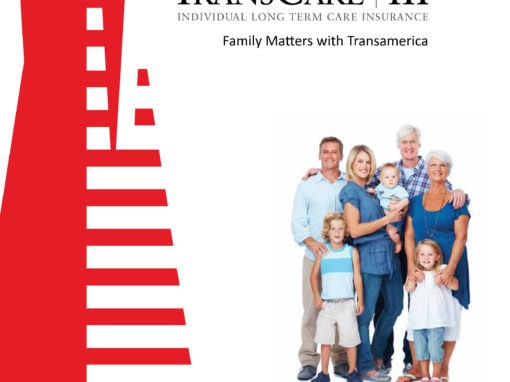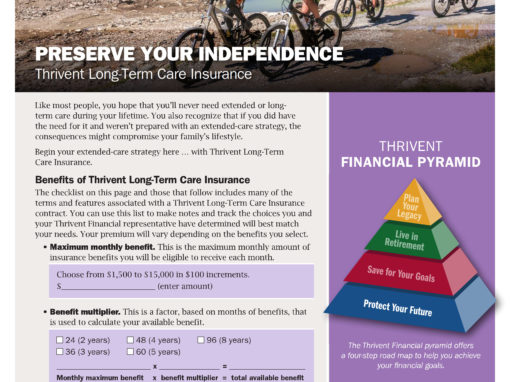Long Term Care Insurance Policy Brochures for Illinois







Long Term Care Insurance Illinois
Long-term care issues can be complex and confusing. With so many options, services, and settings in which care is given, many people delay learning about the issues until they are personally affected. Unfortunately, that is likely to be the time when you are under the most pressure to make a decision, and when time is too short to carefully weigh your options.
Because these long-term care issues deserve your careful attention, don’t wait until it’s too late to find out all you can about this important health care alternative. Don’t wait any longer to find out important information!
What is Long-Term Care?
Long-term care is the day-in, day-out assistance you might need if an illness or disability lasts a long time and leaves you unable to care for yourself. This may or may not include a nursing home stay. In other words, it is a continuum of services that can be provided in a variety of settings ranging from one’s own home, assisted living facility, adult day care facility or a nursing home. Long-term care covers a broad spectrum of care and services ranging from basic personal care to medical care.
Long Term Care Insurance Illinois Shopping Tips
- Shop around for an insurance agent and an insurance company–ask friends, family or neighbors if they recommend their insurance agent or company.
- Ask insurance agents which insurance company’s products they sell; most agents only sell products from a few companies. Compare several different products from several different insurance companies. You might need to talk with several different agents.
- Carefully compare the benefits and restrictions between policies.
- Most LTC insurance premiums increase over time. Carefully evaluate whether premium payments over a long period could be a financial hardship.
- Never pay insurance premiums in cash; do not make checks payable to the insurance agent.
- Read your policy carefully and ask follow up questions.
- Use your 30-day “Free Look” period to return a policy for a full refund if you are not satisfied!
- Understand what a Long Term Care Partnership (LTCPP) policy is, how it differs from non-LTCPP policies, and whether it is affordable for you.
Long Term Care Insurance Illinois
Long term care insurance Illinois includes a variety of services that may be both medically and/or non-medically necessary for people with a chronic illness or disability. Health and personal needs are met through long-term care. Generally speaking, long term care provides people assistance with activities of daily living, such as bathing, dressing, eating, toileting or transferring. People of all ages may need long-term care.
People pay for long-term care in a variety of ways. These include: using the personal resources of individuals or their families, long-term care insurance, and some assistance from Medicaid for those who qualify. Medicare, Medicare supplement insurance, and the health insurance you may have at work usually will not pay for long-term care.
Individual Personal Resources
Individuals and their families generally pay for part or all of the costs of long-term care from their own funds. Many use savings and investments. Some people sell assets, such as their homes, to pay for their long-term care needs.
Medicare
Medicare’s skilled nursing facility (SNF) benefit does not cover most nursing home care. Medicare will pay the cost of some skilled care in an approved nursing home or in your home, but only in specific situations. The SNF benefit only covers you if a medical professional says you need daily skilled care after you have been in the hospital for at least three days and you are receiving that care in a nursing home that is a Medicare-certified skilled nursing facility. While Medicare may cover up to 100 days of skilled nursing home care per benefit period when these conditions are met, after 20 days beneficiaries must pay a coinsurance fee. In 2008, that coinsurance was $128 per day. While Medicare may pay for nursing home care sometimes, it doesn’t cover the costs of care in assisted living facilities. While many people would like to receive care in their own homes, Medicare does not cover homemaker services. In addition, Medicare doesn’t pay for home health aides to give personal care unless you are homebound and are also getting skilled care, such as nursing or therapy. The personal care must also relate to the treatment of an illness or injury, and you can only get a limited amount of care in any week. You should not rely on Medicare to pay for your long-term care needs.
Long Term Care Insurance Illinois
Long-term care insurance is one other way you may pay for long-term care. This type of insurance will pay or reimburse you for some or all of your long-term care. It was introduced in the 1980s as nursing home insurance but has changed a lot and now covers much more than nursing home care. The rest of this Shopper’s Guide will give you information on long-term care insurance.
A Partnership Qualified Policy is a type of policy that allows you to protect (keep) some of your assets if you apply for Medicaid after using your policies benefits.
Illinois Long-Term Care Partnership Program was passed in August 2007 a public-private partnership between states and private insurance companies. It is the intent of this program to reduce future Medicaid costs for long-term care by delaying or eliminating dependence on Medicaid by providing incentives for individuals to insure against the cost of providing for their long-term care needs.
The State of Idaho recommends:
Searching for Rate Increase information in Illinois? We have the answers you need.
For further assistance, please contact us.


